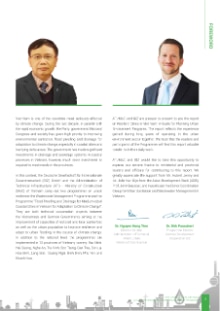Link to the SECO project:
Resilient Cities in Viet Nam: A Guide for Planning Urban Environment Programs (2016)

| Publication year | 2016 |
|---|---|
| Pages | 31 |
| Price | free |
| Languages | English |
(PDF, 31 Pages, 11.0 MB, English)
Viet Nam is one of the countries most seriously affected by climate change. During the last decade, in parallel with the rapid economic growth, the Party, government, National Congress and society has given high priority to improving environmental sanitation, flood proofing and drainage for adaptation to climate change, especially in coastal cities and low-lying delta areas. The government has made significant investments in drainage and sewerage systems in coastal provinces in Vietnam, however, much more investment is required to meet needs in the provinces. In this context, the Deutsche Gesellschaft für Internationale Zusammenarbeit (GIZ) GmbH and the Administration of Technical Infrastructure (ATI) - Ministry of Construction (MoC) of Vietnam carry out two programmes on urban resilience: the Wastewater Management Programme and the Programme “Flood Proofing and Drainage for Medium-sized Coastal Cities in Vietnam for Adaptation to Climate Change”. They are both technical cooperation projects between the Vietnamese and German Governments aiming at the improvement of capacities of national and local authorities as well as the urban population to improve resilience and adapt to urban flooding in the course of climate change. In addition to the national level, the programmes are implemented in 13 provinces of Vietnam, namely: Bac Ninh, Hai Duong, Nghe An, Tra Vinh, Soc Trang, Can Tho, Son La, Hoa Binh, Lang Son, Quang Ngai, Binh Dinh, Phu Yen and Khanh Hoa. ATI/MoC and GIZ are pleased to present to you the report on Resilient Cities in Viet Nam: A Guide for Planning Urban Environment Programs. The report reflects the experience gained during long years of operating in the urban environment sector together. We trust that the readers and participants of the Programme will find this report valuable to refer to in their daily work.
